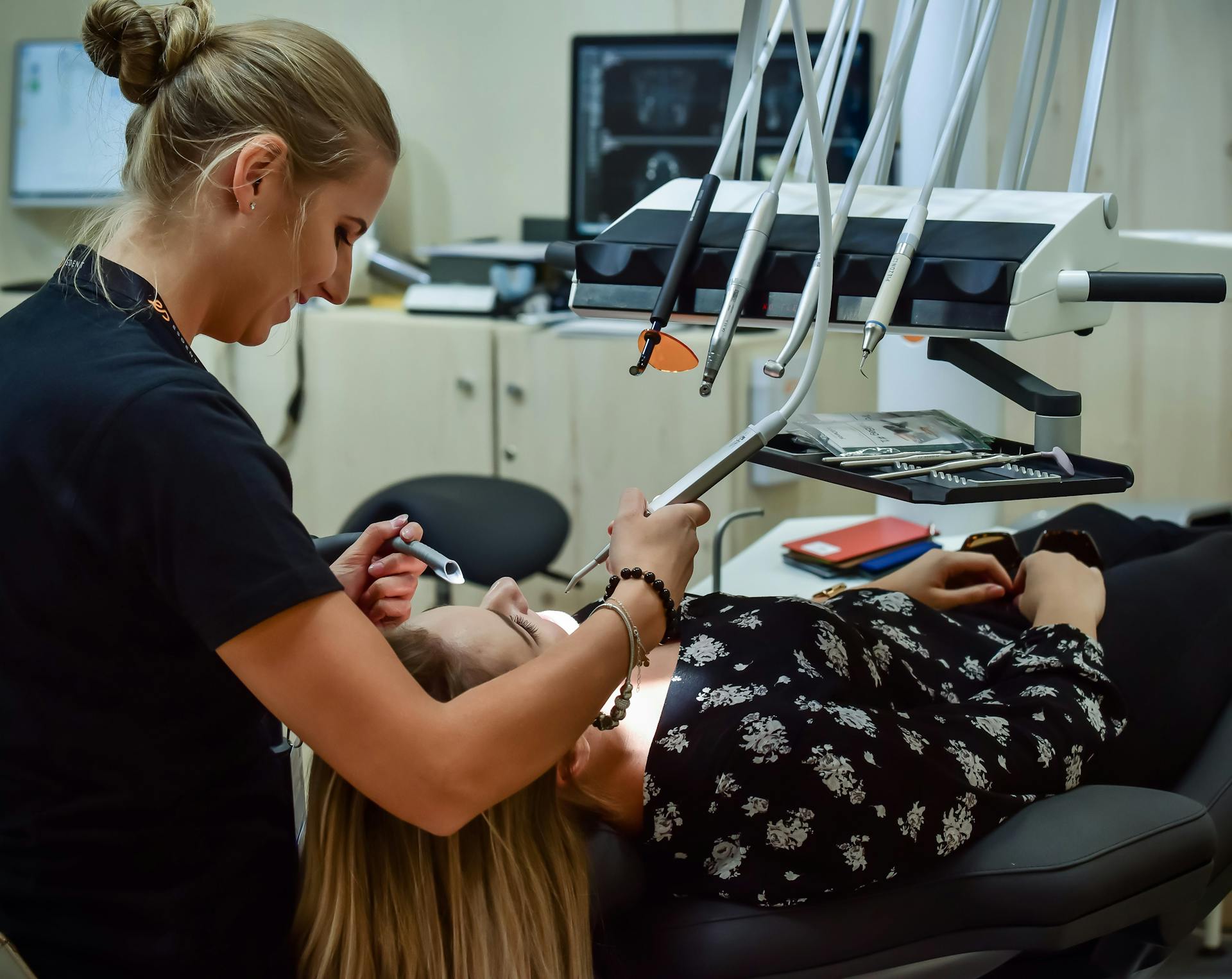
Working as a dentist in Luxembourg
Explore rewarding careers and salaries in dentist jobs in Luxembourg. Your guide to thriving in Luxembourg's dental sector.
For dentists from abroad, Luxembourg is an ideal place to build an international career, offering a strong healthcare system and a diverse culture at the workplace. This article will help you figure out the details to buiding a career in the country in dentistry medical sphere.
Getting general or specialised dentist jobs in Luxembourg requires first and foremost (like for any medical career) obtaining a license from the Ministry of Health. All applicants are evaluated in terms of their:
- professional qualifications,
- adherence to medical ethics,
- good prior reputation,
- language skills,
- with physical and mental health also being taken into account.
Who can become a dentist in Luxembourg
It’s the easiest to become a practicing dentist in Luxembourg for the residents of one of the EU member states, a member state of the European Economic Area, which include Iceland, Liechtenstein and Norway, or Switzerland.
Residents of third countries must be granted international protection or obtain a residence permit, before applying for the license, even if they satisfy other criteria.
Who can not become a dentist?
Those permanently or temporarily disqualified from practicing dentistry in their previous country of practice cannot become a dental practitioner in the Grand Duchy. The same applies to specialists with disqualification currently pending.
To become a dentist, you need to spend 6 to 8 years in training and education. There are a variety of fields for those with a BDS (bachelor degree in dental surgery) in Luxembourg.
General Dentistry
Specialist Dentistry
Dental Hygiene
Public Health Dentistry
Sales and Marketing in Dentistry
Academic or Research
Dr. Who?
You can work as a general or specialist dental practitioner in Luxembourg without using 'Doctor' or 'Dr' as your academic title. In fact, if you want to use one of these titles, you have to prove your qualifications, so they are added to the certificates’ register.
Requirements and education needed to become a dentist
In Luxembourg students apply for Bachelor of Dental Surgery (BDS) programs in January and February. However, the exact dates for admission vary between universities and dentistry schools, so future students are advised to check in with the establishments they want to apply to.
Some dentistry schools also hold an entrance exam, either the BioMedical Admissions Test (BMAT) or the Health Professions Admission Test (HPAT). Some schools hold preliminary interviews to gauge the applicants’ communication skills, motivation and aptitude for the profession.
- Completed admission application form,
- Proof of Secondary education,
- Language proficiency certificate,
- Entrance exam results, if any,
- Passport or ID-card,
- Letters of recommendation from previous place of education,
- Cover letter for application, personal statement,
- CV or resume,
- Criminal record certificate from the country of residence,
- Proof of health insurance for the study period,
- Proof of sufficient financial resources,
- Required visa or Residence Permit.
All documents must be translated into the primary language of education, either French or German.
How much can education cost?
If you are accepted into a BDS program, you’ll receive an official notification, which includes detailed information on your enrolment, as well as all the due payments, if there are any in your case.


Paying for education is far from the only thing students will have to spend money on: don’t forget rent, buying textbooks, medical insurance, and a whole host of other needs.
How to start your medical practice as a dentist

After receiving BDS one can finally apply for a medical license from the Ministry of Health. There are several ways to apply for a licence, you can do so both online and offline.
Online application
Offline application


- Criminal record certificate issued by the country or countries of residence less than 3 months ago;
- Certificate of good mental and physical health issued less than 3 months ago by a licensed physician;
- For the diplomas, recognized in EU: a copy of the diploma and transcripts (the dentistry diploma for a general dentist, the dentistry diploma and the specialization diploma for a specialist dentist);
- For foreign diplomas: a copy of the letter of recognition for the diploma in question and a copy of the license for dental practice as general or specialist dentist in a third country or one of the EU member states;
- Certificate of good moral standing and professional honesty issued by Ordre des chirurgiens-dentistes;
- Professional CV;
- State fee payment receipt. A fee of 450 euros must be previously paid to the following bank account: Administration de l’enregistrement, des domaines et de la TVA / IBAN: LU13 1111 0011 4679 0000 Swift/BIC: CCPLLULL / Communication: AUTOPROFSANTE + applicant's full nameIBAN: LU13 1111 0011 4679 0000 / Swift/BIC: CCPLLULL / Communication: AUTOPROFSANTE + applicant's full name
- A copy of a certificate proving the applicant’s language proficiency if their native language isn’t French, German or Luxembourgish.
After submitting the application all messages and notifications related to the changes in your application’s status will be sent to your email address.
Can it be faster?
To make the process quicker, make sure your application includes all the necessary information and the documents required.
How can a foreign dentist work in Luxembourg
If you're a third country national, such as for instance Pakistani or Indian, who wants to work as a dentist in Luxembourg, you'll have to follow the general rules set by the Ministry of Health. Be ready for the entire process to take from a few years to a decade: it depends on where you are currently on your path to being a full-fledged dentist.
Study either French or German. Both are official languages of the Grand Duchy, you’ll need to be proficient in at least one of them to practice dentistry within the country. You’ll need to obtain at least a B2 level certificate to prove your language proficiency. If you find it hard to choose which language to study, choose French — it’s the main language used for education in Luxembourg.
Enroll in a university or dentistry school in your country of origin for higher education. Gather information prior and choose a university or school recognized by the national medical council or board (for India that’s NMC, National Medical Commission). The BDS degree will include four years of studying theory, while the fifth and final year will be dedicated to internship. You can go to Luxembourg for an internship; however, that’s only possible if your chosen university is partnered with a university or school in the Grand Duchy.
Once you graduate, you can apply for postgraduate training and residency in Luxembourg. Don’t forget to apply for the recognition of your diploma as well — the process can take a few months, so the sooner you do it, the better.
Since you are not yet a full-fledged Luxembourg resident at this point, you will also have to submit a valid residence permit and a work permit to the Ministry of Health.
After completing your postgraduate training, apply for a full-time job as a dentist in one of Luxembourg’s clinics, or start your own private practice. At this point your journey is more or less complete: the only goal left would be striving for long-term resident status and, eventually, citizenship.
Job opportunities and salaries for dentists in Luxembourg in 2024
Dentists are in high demand in Europe as whole and country in particular. As a result, the average salary for a Luxembourg dentist is growing 7% a year, and this is faster than the national average!
Here you can find a table, that will tell you more about what to expect, when you apply for a job as a dentist in the country. Keep in mind, that the wages are correlated with the high expenses when living in the country, or consider working as a cross-border worker.
| Qualification | Approximate salary |
| Dental Hygienist | €30,000–50,000 per year |
| General Dentist | €50,000–80,000 per year |
| Specialist Dentist | €100,000 per year |
| Median for all qualifications | €128,500 per year |
| Average for all qualifications | €136,200 per year |
What are median and average?
The median salary is the middle value in a list of salaries, meaning half of the salaries are above it and half are below it. On the other hand, the average salary is calculated by adding up all the salaries and then dividing by the number of salaries. Median gives a more middle-ground perspective.
Frequently Asked Questions (FAQ)
Which dentistry specialization is the most well-paid?
Orthognathic (jaw) surgery has the highest pay grade, but it’s also the most difficult among all the career paths in dentistry. Fun fact, the wealthiest dentist in the world is Doctor Dan Fischer. He’s the CEO and President of Ultradent Products, a company worth 1,1 billion dollars.
Which is the most widespread dental issue in the world?
How much time it takes to become a dentist in Luxembourg?
Source: guichet.public.lu, www.quora.com, worldsalaries.com, www.standyou.com
We took photos from these sources: Alex Padurariu for Unsplash, Cottonbro Studio for Pexels